Source: SYSU News Center
Writtern by: LIU Jiao
Acknowledgement: Ian J. Heuer
Edited by: JIN Feng
At Sun Yat-sen University (SYSU), there is a group of students interested in teaching Chinese as foreign language. They have spent one or two years in places such as Australia, Korea, America and Hong Kong to teach Chinese. They all love Chinese culture and Chinese language, and are energetic and enthusiastic, willing to experience different cultures and take Chinese to other parts of the world.
Most of them work as volunteers in Confucius Institutes (CIs), and some others apply for relevant projects provided by Hanban (the national office in charge of teaching Chinese, and the administrator of Confucius Institutes). As a result of their experiences, they grew up and gained sweet memories while engaged in research activities or honing their excellent teaching capabilities. Here are several stories about those students who recently went to teach Chinese in different parts of the world.
Self-development in Australia
Luo Chaoning and Guo Shenshen, majoring in International Education, are students from the School of Chinese as a Second Language (SCSL) at SYSU. They took part in Australia’s School Language Assistant Program (SLAP) from February 2014 to December 2014, which is not a Confucius Institute project, but still receives assistance from Hanban in selecting volunteer teachers from different universities.
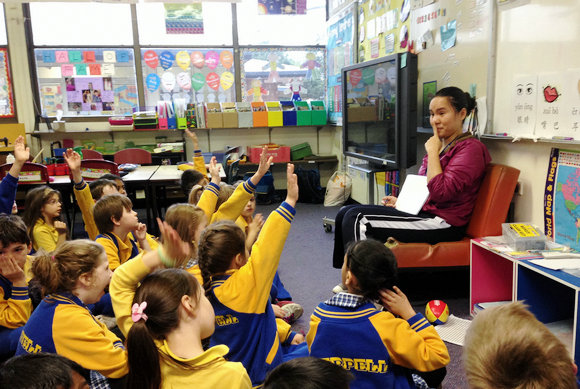
Luo Chaoning taught second grade pupils body parts in Chinese class at Australia Melbourne Serpell Primary School
This project offered the two girls a great chance to experience intercultural exchange and gain access to an Australian classroom. They assisted language teachers at two primary schools by preparing teaching materials, organizing classroom activities, and leading group discussions and after-school tutoring. They found Australian teachers to be very experienced in cultural education, integrating such Chinese cultural elements as Chinese calligraphy, painting, paper-cutting, and cuisine into class. Australian children were frank and earnest, and had friend-like relationships with their teachers. However, they also realized there were problems with Chinese instruction in Australia, such as the obscurity of teaching syllabi, the lack of local Chinese textbooks, and the shortage of good Chinese teachers.
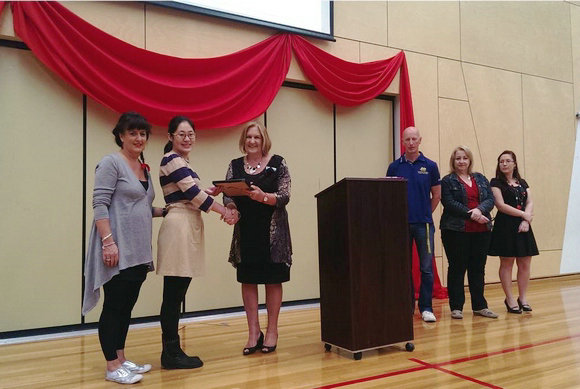
Guo Shenshen receives honor from principal of Aspendale Gardens Primary School for her contribution in SLAP
SLAP has helped to improve the Chinese teaching situation in Australia, and has also provided the two girls a chance to grow up in Australia. Guo Shenshen lived with four different host families during that year. Moving to new families so many times meant that she had to quickly adapt to new environments. Fortunately, Guo managed to keep good relations with these families, and learned to be cooperative and independent. Luo Chaoning also had pleasant experiences in Australia. She met an autistic boy who was treated kindly by parents and children; she met a pregnant housewife who still held community voluntary activities one day before giving birth to a child; and she also met two female backpackers from Canada who were already 85 years old. These lovely people gave her a better understanding of life.
Sweet Memories in Korea
Korean people are eager to learn Chinese these days. The first Confucius Institute was founded in Korea in 2004. Thanks to the China-ROK Free Trade Agreement (FTA) and Chinese language encouragement policy put forward by the Korean government, there have been a total of 62,923 Korean students studying in China till 2014. Korean students account for nearly half of the overseas HSK (hànyǔ shuǐpíng kǎoshì, a standardized test of Chinese language proficiency) examinees.
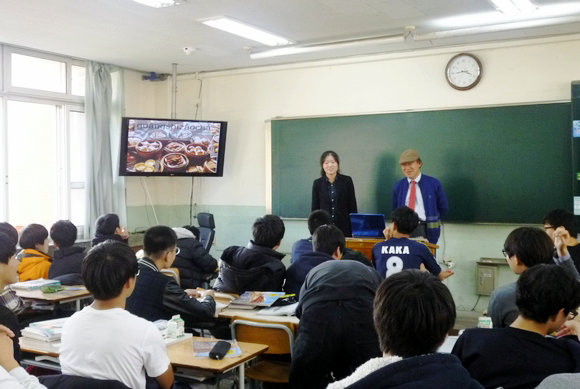
Chen Hui and her partner teacher taught Korean high school students Chinese
Chen Hui, a student from SCSL, also majoring in International Education, was one of the five volunteers who went to Korea during February 2014 and January 2015. She taught Chinese in a boy’s school. So fantastic!
Chen Hui had never dreamed about going to Korea because she majored in Japanese in her undergraduate study, but she was lucky to get the opportunity provided by Hanban after she came to SYSU. She was excited upon hearing she could teach students at a boy’s school, and confident that she could teach them well. Chen Hui taught four classes in cooperation with local teachers and instructed a Chinese interest club of twelve students. She always came up with great ideas to draw these boys’ attention. Upon realizing that these boys were not very interested in certain aspects of traditional Chinese culture, like paper-cutting or traditional dress, Chen Hui added topics like high-speed rail, Guangdong tea culture, morning exercise, and entertainment programs to make them interested in her class. Chen Hui and the Chinese interest club members also cooked Chinese food and went to Chinatown and a Chinese culture museum together.
Her life in Korea was difficult at first but rewarding in the end. Unfamiliar with the language and transportation, Chen Hui dared not to go out of the school for the first few months. With no special feeling for the county when she first arrived, she was gradually moved by things that happened there. One of her students even wrote a letter to her in three languages.
Before leaving Korea, Chen Hui presented photos about her experience to her students, and said to them, “I am only one of many Chinese teachers who have taught you, but this experience may be the only time for me. You are so special and wonderful.” For Chen Hui, this experience will survive forever as a series of sweet memories.
Research Travel in Hong Kong
Wang Xiaobo, who majors in International Education in SCSL, went to the Confucius Institute of Hong Kong (CIHK) as a volunteer last February.
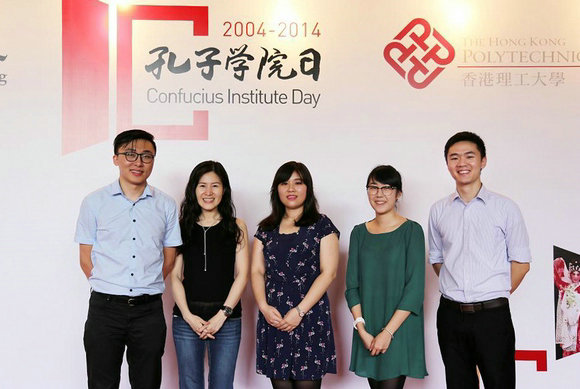
Group photo of Wang Xiaobo (first on the right) and HKCI staff taken on Confucius Institute Day
To meet local demands as well as make use of local resources, Confucius Institutes have developed into different types. Take for example the Business CI at the University of Leeds and the Chinese Medicine CI at Royal Melbourne Institute of Technology: both are uniquely adapted to serve the institutions in which they are hosted. CIHK is known as a research CI. Last year, CIHK wanted to add a student who had teaching experience at a CI. The fact that Wang went to the Philippines before made him stand out among many candidates.
Wang was mainly responsible for organizing activities and promoting communication among different departments in CIHK. During the past year, he helped organize many academic lectures, forums, and symposiums. Examples include: the Specialist Lectures on Chinese History and Culture, an Expert Forum on Teaching Chinese as a Foreign Language, and a symposium called Teaching Chinese to Non-Chinese Speaking Students in Hong Kong. Among the activities he organized, however, he was most proud of the Confucius Institute Day. He modeled it on the form of a Chinese cultural festival, which attracted many students, teachers, and visitors. This was the first time CIHK held a Confucius Institute Day, but the event was so successful that it was turned into an annual activity.
Besides his work at CIHK, Wang also went to different places in Hong Kong and recorded his life there by taking photos.
Self-cultivation in Indiana
This is the fourth year of Huang Yanqiong’s postgraduate study in SCSL. She has spent two years teaching Chinese in the Confucius Classroom at the International School of Indiana (ISI), from July 2012 to July 2014.
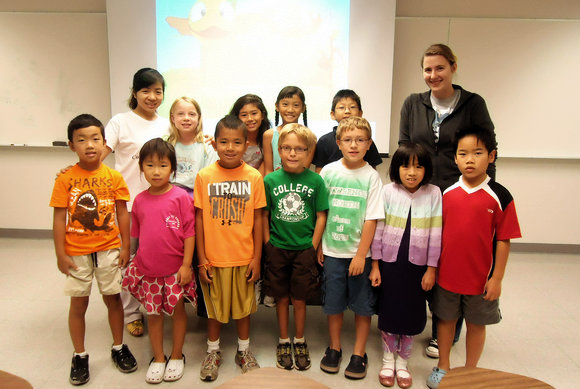
Group photo of Huang Yanqiong and primary students at Chinese Musical class of the Confucius Institute in Indianapolis Language and Culture Summer Camp
After Huang came to the school, she was inevitably confronted with the challenges of intercultural communication. She was told not to run in public places even if there is only one minute before class, because running in public places would cause a panic. Chinese food was attractive to foreign students, but if such a food festival was held in America, she had to be very cautious not to let students come in contact with potential allergens like eggs, milk, and even flour. Also, she needed to pay special attention to avoiding discrimination in teaching. For example, when explaining Chinese phrase “Chi Cu (be green with envy)” to students, she said that we’d better not say “if you have a boyfriend, and he also likes another girl, you are said to be green with envy” because this sentence could be perceived as exclusionary to certain people.
Huang is under great pressure in her teaching. She has 26 class hours each week. During her first year in Indiana, she never got time to travel, as she was continually engaged in planning different kinds of class activities, organizing Chinese culture activities, and taking part in on-the-job training and teaching seminars.
Her hard work and excellent performance has brought her lots of honors. She was named as the 2013 Excellent Teacher of the Confucius Institute in Indianapolis High School Department, and she was also the 2012 National Postgraduate Scholarship winner and one of the 2014 Ten Outstanding Youth Volunteers in SYSU. Now, Huang has got an offer as a Chinese teacher in a foreign country. She says she stands for more than just herself, Huang Yanqiong. Her experience represents all international Chinese teachers who are willing to devote themselves to International Education.



